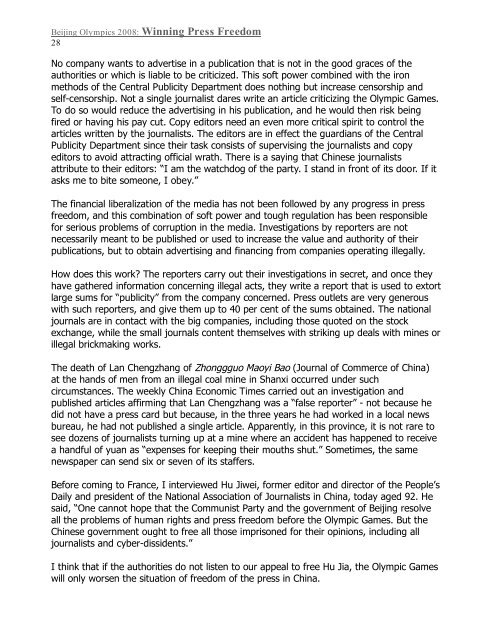Beijing Olympics 2008: Winning Press Freedom - World Press ...
Beijing Olympics 2008: Winning Press Freedom - World Press ...
Beijing Olympics 2008: Winning Press Freedom - World Press ...
You also want an ePaper? Increase the reach of your titles
YUMPU automatically turns print PDFs into web optimized ePapers that Google loves.
<strong>Beijing</strong> <strong>Olympics</strong> <strong>2008</strong>: <strong>Winning</strong> <strong>Press</strong> <strong>Freedom</strong><br />
28<br />
No company wants to advertise in a publication that is not in the good graces of the<br />
authorities or which is liable to be criticized. This soft power combined with the iron<br />
methods of the Central Publicity Department does nothing but increase censorship and<br />
self-censorship. Not a single journalist dares write an article criticizing the Olympic Games.<br />
To do so would reduce the advertising in his publication, and he would then risk being<br />
fired or having his pay cut. Copy editors need an even more critical spirit to control the<br />
articles written by the journalists. The editors are in effect the guardians of the Central<br />
Publicity Department since their task consists of supervising the journalists and copy<br />
editors to avoid attracting official wrath. There is a saying that Chinese journalists<br />
attribute to their editors: “I am the watchdog of the party. I stand in front of its door. If it<br />
asks me to bite someone, I obey.”<br />
The financial liberalization of the media has not been followed by any progress in press<br />
freedom, and this combination of soft power and tough regulation has been responsible<br />
for serious problems of corruption in the media. Investigations by reporters are not<br />
necessarily meant to be published or used to increase the value and authority of their<br />
publications, but to obtain advertising and financing from companies operating illegally.<br />
How does this work? The reporters carry out their investigations in secret, and once they<br />
have gathered information concerning illegal acts, they write a report that is used to extort<br />
large sums for “publicity” from the company concerned. <strong>Press</strong> outlets are very generous<br />
with such reporters, and give them up to 40 per cent of the sums obtained. The national<br />
journals are in contact with the big companies, including those quoted on the stock<br />
exchange, while the small journals content themselves with striking up deals with mines or<br />
illegal brickmaking works.<br />
The death of Lan Chengzhang of Zhonggguo Maoyi Bao (Journal of Commerce of China)<br />
at the hands of men from an illegal coal mine in Shanxi occurred under such<br />
circumstances. The weekly China Economic Times carried out an investigation and<br />
published articles affirming that Lan Chengzhang was a “false reporter” - not because he<br />
did not have a press card but because, in the three years he had worked in a local news<br />
bureau, he had not published a single article. Apparently, in this province, it is not rare to<br />
see dozens of journalists turning up at a mine where an accident has happened to receive<br />
a handful of yuan as “expenses for keeping their mouths shut.” Sometimes, the same<br />
newspaper can send six or seven of its staffers.<br />
Before coming to France, I interviewed Hu Jiwei, former editor and director of the People’s<br />
Daily and president of the National Association of Journalists in China, today aged 92. He<br />
said, “One cannot hope that the Communist Party and the government of <strong>Beijing</strong> resolve<br />
all the problems of human rights and press freedom before the Olympic Games. But the<br />
Chinese government ought to free all those imprisoned for their opinions, including all<br />
journalists and cyber-dissidents.”<br />
I think that if the authorities do not listen to our appeal to free Hu Jia, the Olympic Games<br />
will only worsen the situation of freedom of the press in China.





